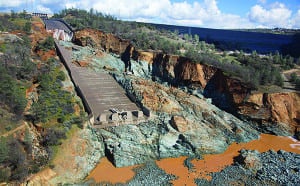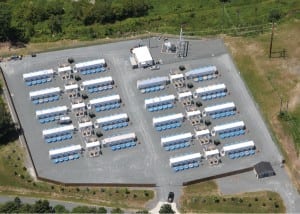ferc
-
Coal
Concerns About Summer Reliability in Texas and California Persist
Higher-than-average temperatures forecast for much of the U.S. this summer won’t affect reliability in most regions, though concerns remain for Texas and Southern California, according to the Federal Energy Regulatory Commission (FERC). Presenting the “Summer 2018 Energy Market and Reliability Assessment,” on May 17, FERC staff said that most entities that are part of the […]
-
Coal
Sufficient Blackstart Capability Exists on Grid, Say NERC, FERC
Despite the recent retirement of “blackstart” units, grid operators have sufficient resources to quickly restore systems in the event of widespread outages, suggests a new report by staff at the Federal Energy Regulatory Commission (FERC) and the North American Electric Reliability Corporation (NERC). The report—“FERC-NERC-Regional Entity Joint Review of Restoration and Recovery Plans”—released May […]
Tagged in: -
Renewables
PJM: More Than 3,600 MW Will Retire in 2018
Data from regional transmission organization (RTO) PJM Interconnection shows about 630 MW of power generation will be taken offline in the grid operator’s territory in April, with more than 3,600 MW scheduled to be retired this year, according to the organization’s website. This month’s deactivations are scheduled to begin April 16. Last week, Ohio power […]
Tagged in: -
Commentary
Market Barriers Eased for Energy Storage Resources
The Federal Energy Regulatory Commission (FERC) adopted a final rule on February 15 (Order No. 841) that facilitates the direct participation of electric storage resources in centralized markets operated by
-
Legal & Regulatory
FirstEnergy Entreats DOE to Save Coal and Nuclear Plants
A day after FirstEnergy Corp.’s competitive arm notified PJM Interconnection it would close four uneconomic nuclear units—a total of 4 GW—in Ohio and Pennsylvania between 2020 and 2021, it urged Energy Secretary Rick Perry to issue an emergency order directing the regional transmission organization (RTO) to secure nuclear and coal capacity for long-term reliability. FirstEnergy […]
-
Legal & Regulatory
Experts: Warfare Between Coal and Gas Is Nonexistent
Markets may currently favor natural gas, but coal, which has been diminished for “good reason,” will likely have a significant place as a reliable fuel for power generation, a diverse panel of U.S. coal experts—including a generator, a supplier, and a market analyst—suggested at CERAWeek by IHS Markit in Houston on March 7. Coal lost […]
-
Legal & Regulatory
FERC Finds No Evidence of Gas Withholding in New England
No evidence exists that New England local gas distribution companies engaged in practices to withhold natural gas pipeline capacity on the Algonquin system to drive up gas or power prices in the region, Federal Energy Regulatory Commission (FERC) staff revealed. FERC on February 27 closed an inquiry after conducting an “extensive review” of the allegations—which […]
Tagged in: -
Renewables
Human Errors Contributed to Oroville Spillway Failure
Damage to the main and emergency spillways of the Oroville Dam in California, triggered in February 2017 by heavy rain that was part of Northern California’s wettest winter in almost 100 years, has brought
-
Distributed Energy
FERC Clears Barriers for Energy Storage but Not Aggregated DERs
The Federal Energy Regulatory Commission (FERC) finalized a rule to make it easier for energy storage resources to participate in capacity, energy, and ancillary services in wholesale electricity markets. The final rule, approved unanimously by the five-member commission, will require independent system operators (ISOs) and regional transmission organizations (RTOs) to revise tariffs to establish a […]
Tagged in: -
Legal & Regulatory
More Premature Nuclear Unit Retirements Loom
Two more U.S. nuclear power plants are facing early retirement, joining a string of generators whose fate was determined by market conditions, political pressure, or financial stresses assailing the sector. Several others may be poised to join them. The 647-MW Duane Arnold nuclear plant in Palo, Iowa, will likely close in 2025 after a current […]








